Events
Building Closer Scientific Connections between Lithuania and Moldova
11 07 2024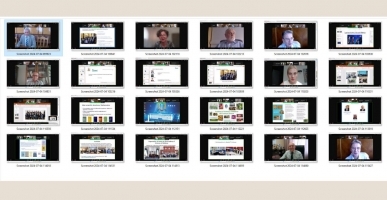
On 4 July 2024, a virtual conference was held to discuss the prospects for cooperation between the Lithuanian and Moldovan academies of sciences. Opening the event, Prof. Jūras Banys, the president of the Lithuanian Academy of Sciences, emphasised that it was the first meeting of this kind between two academies. It should stimulate cooperation in relevant fields of research, but building sustainable relations required a better knowledge of one another and finding out the interests and scientific potential of each side.
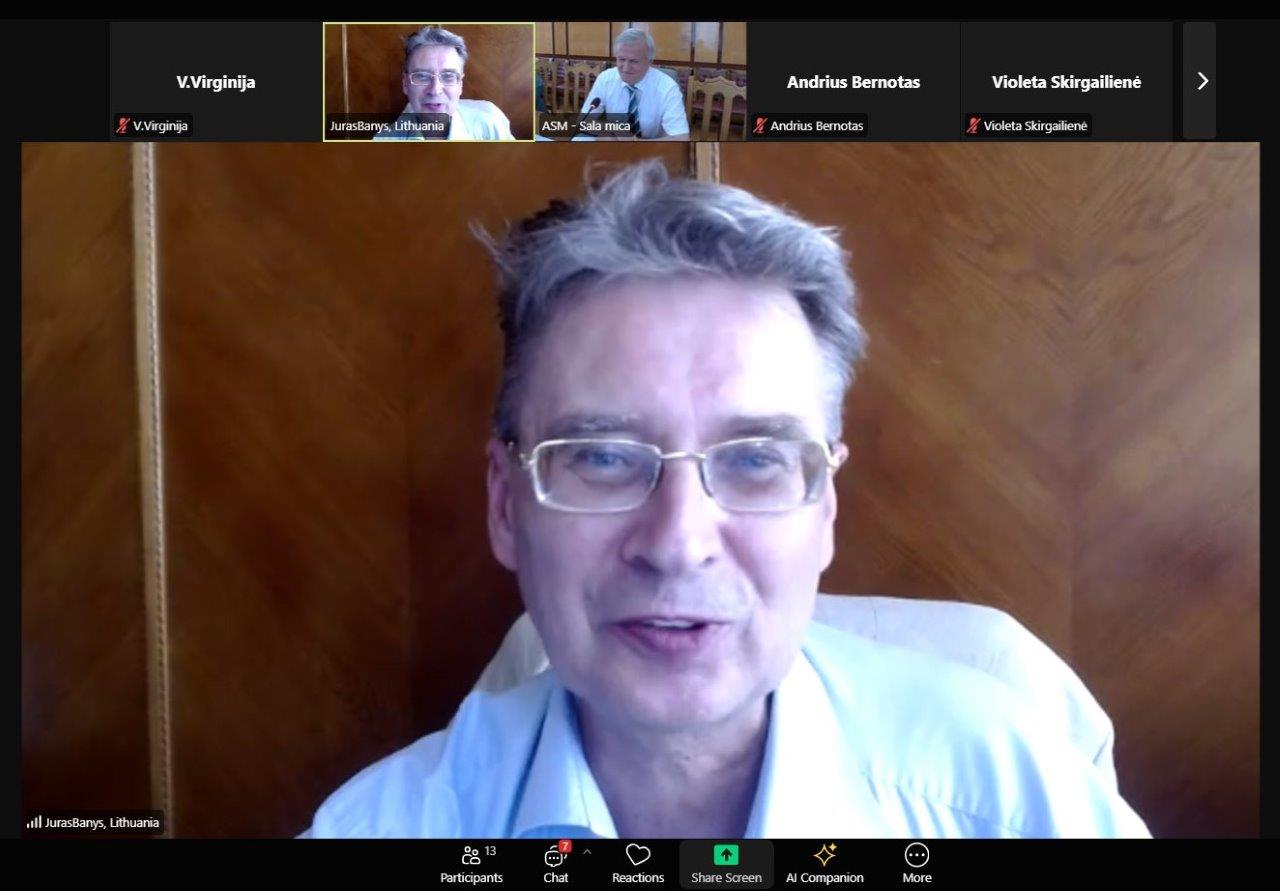
President of the Lithuanian Academy of Sciences Jūras Banys
Prof. Banys added that such fields of scholarship as social research (analysing the societal changes in Lithuania since the country’s accession to the EU) and research into the links between the history of Lithuania and fifteenth-century history of Moldova may be of particular interest to the academicians of both countries.
In response to the first presentation, Prof. Ion Tighineanu, the president of the Academy of Sciences of Moldova, proposed organising a joint seminar this coming autumn to compare demographic problems and changes in the structure of society, because Lithuania had solved these issues, and Moldova would like to learn from Lithuania’s experience. Prof. Maslauskaitė supported this idea.
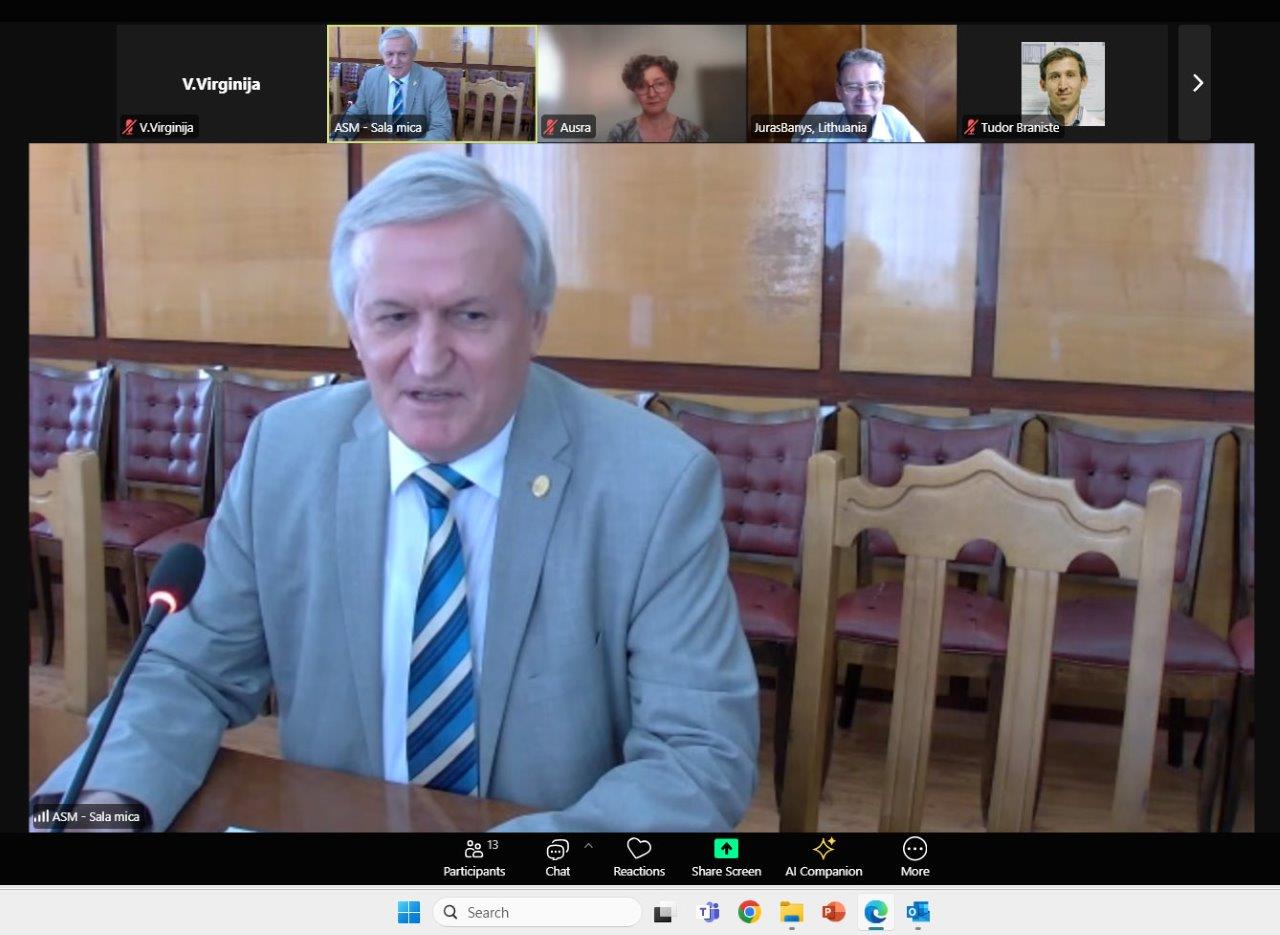
President of the Academy of Sciences of Moldova Ion Tighineanu
Prof. Tighineanu saw a great opportunity and added that the ambassadors of Moldova and Lithuania were attending the conference.
Prof. Limas Kupčinskas spoke about the activities of the Division of Medical, Biological, and Geosciences. As the members of the division regularly organise various international conferences, Prof. Kupčinskas invited Moldovan colleagues to participate. Prof. Banys mentioned experienced Lithuanian medical professionals, including cardiologists, transplantation and biotechnology specialists, and the experience gained in overcoming the COVID-19 pandemic.
The president of the Academy of Sciences of Moldova welcomed the proposal of cooperation between the researchers of the two countries in these areas. Not long ago, the members of the Moldovan academy organised a conference on the impact of the pandemic on human health, as its effects are still being felt. It is important to investigate this and to better understand the mechanisms of this insidious disease.
Prof. Gintautas Dzemyda, the chair of the Division of Technical Sciences, informed that the Lithuanian Academy of Sciences has scientific cooperation agreements with the academies of Armenia, Kazakhstan, Albania, and some others. He also mentioned the recently organised international conference on digital business and smart systems. Prof. Banys added that Lithuania had to solve a number of problems to successfully disconnect from the energy system of the Soviet Union, thus strengthening its energy and cyber security. This experience can be shared, as the members of the Lithuanian Academy of Sciences contributed significantly to this process. Prof. Ion Tighineanu agreed that for them, too, energy security was a topic of high relevance.
Prof. Vidmantas Stanys, the chair of the Division of Agriculture and Forestry Sciences, emphasised the involvement of the division in various interdisciplinary research projects and the focus of its members on inter-institutional and international cooperation. Such activities facilitate the improvement of the quality of food, the properties of cereals, grasses, and berries, preservation of Lithuania's forests, and the increase in their genetic diversity. Prof. Banys pointed out that as agriculture accounted for a significant share of Lithuania’s gross domestic product, growing top quality fruit and berries, improving cereal varieties and their resistance to climate change and pests were crucial.
The president of the Moldovan academy remarked that this topic was perhaps even more important for Moldova, so there was plenty of room for joint research.
Dr Ieva Plikusienė, the chair of the Young Academy of the Lithuanian Academy of Sciences, introduced the structure and activities of the division to the participants of the conference. The young academicians act as mentors and experts, represent the interests of young researchers, give lectures to schoolchildren, and participate in international organisations.
Prof. Tighineanu noted that the Young Academy of the Academy of Sciences of Moldova was only two years old, and therefore he would like to see more communication and sharing of experience.
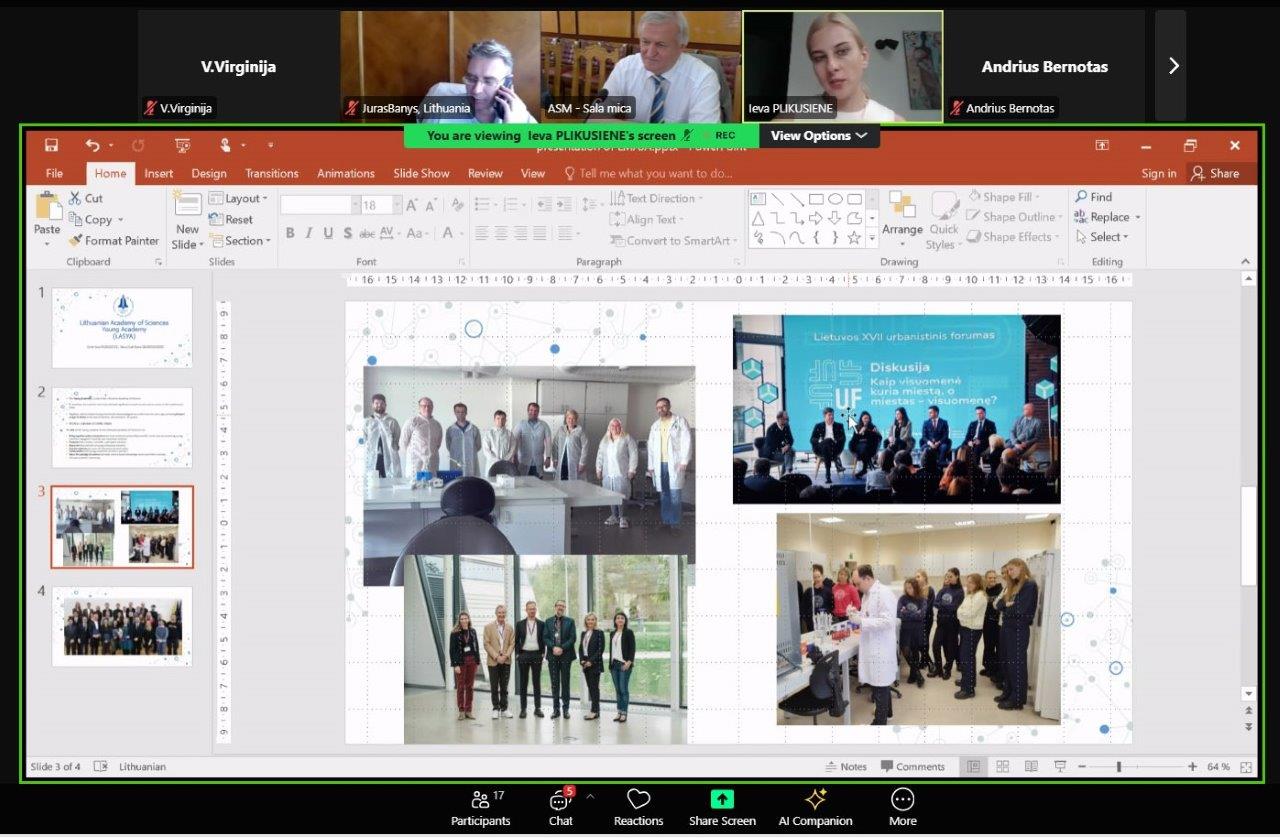
Introduction of the activities of the Young Academy of the Lithuanian academy
Prof. Svetlana Cojocaru, a vice-president of the Moldovan academy and the chair of the Division of Exact and Engineering Sciences, gave an overview of the activities of the division and presented several proposals for possible cooperation in the fields of semiconductors, electrochemical technologies, molecular design of pharmaceuticals, cryptography, natural language/speech processing, and e-learning systems in the fields of education, health, and culture. As Moldova is located in a seismically active region, geology and seismology are of high importance.
With a view of achieving energy neutrality by 2050, Prof. Cojocaru also mentioned such research areas as nuclear geochronology, energy conversion systems, smart energy communities, and the like.
The president of the Academy of Sciences of Moldova added that the biomedical engineering and nanotechnology fora organised in Moldova showed that there is room for joint research with Lithuanian scientists. To learn more about research activities and achievements and find partners, the presentations prepared for this conference will be available online.
Prof. Eva Gudumac, a vice-president of the Academy of Sciences of Moldova and the chair of its Life Sciences Division, noted the high-level cardiology and transplantology in Lithuania. Meanwhile, in Moldova, significant efforts are expended to investigate widespread, multiple congenital developmental disorders. Every year, around 700 children are born with such defects in Moldova. Some of them – pulmonary fibrosis, hepatitis, circulatory diseases, etc. – are known to be caused by COVID. In addition, around 40% of the country's population suffer from allergic reactions. Not surprisingly, this is why Moldovan scientists are studying the impact of the environment on health and fighting drug-resistant tuberculosis. Research into rare diseases is also conducted with Romanian scientists.
Agricultural sciences focus on sustainable agriculture, genetic improvement of animals, adaptation to climate change, and use of microorganisms for the synthesis of nanomaterials.
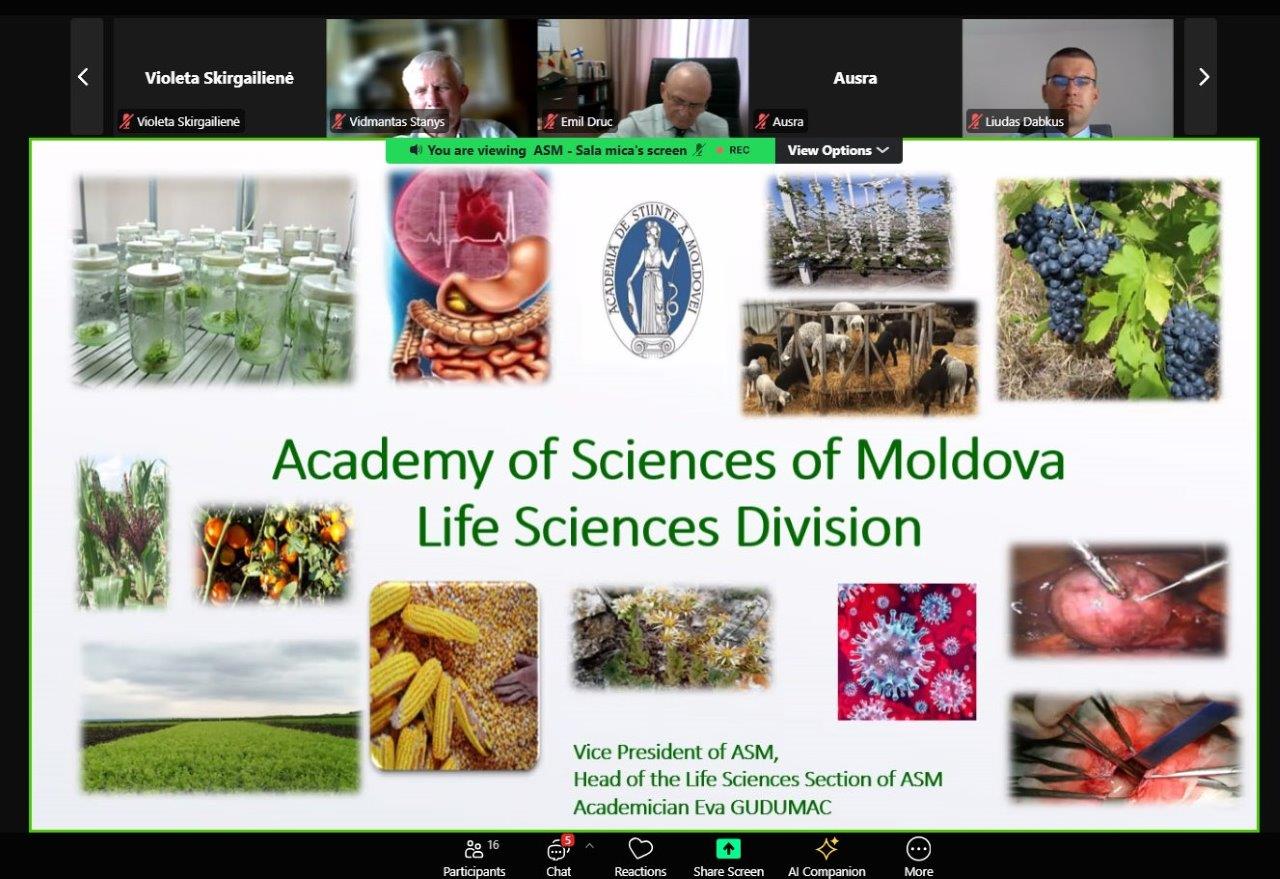
Overview of the activities of Division of Exact and Engineering Sciences of the Moldovan academy
Scholars also investigate the influence of the Church in forming the moral principles of the community; in this field, the speaker proposed collaboration with the Lithuanian Academy of Sciences.
Among other potential fields of collaboration, Ion Hadârcă mentioned joint research into the history of both countries. Studies in sustainable architecture and development of rural settlements also attract considerable attention.
Dr Tudor Braniste, the chair of the Young Academy of Moldova, pointed out that their activities were based on the international model. The Young Academy aims to become a platform for young researchers.
Among its important missions is popularisation of sciences in society and promotion of top-level research. The members of the Young Academy of Moldova visit schools and give talks there. They organise ‘The Path to Scientific Discoveries’ summer schools for schoolchildren and students in higher education. Dr Braniste was interested if anyone from the Young Academy of the Lithuanian Academy of Sciences would like to give a lecture at this school.
The young academicians maintain contacts with young academies of Hungary and Poland and conduct joint research projects.
Prof. Tighineanu, the president of the Academy of Sciences of Moldova, observed that sometimes young scientists are successful in communicating with the public in a very persuasive way. He thanked the Lithuanian Academy of Sciences for organising the virtual meeting of the two academies.
At the end of the event, Prof. Banys concluded that there were many areas and topics where the two academies could join forces. The most important thing is that we are free. Our countries must cherish democracy and cooperate as equal partners in various areas.
Dr Rolandas Maskoliūnas, Chief Specialist for Public Relations
Translated by Diana Barnard
Photography Virginija Valuckienė
